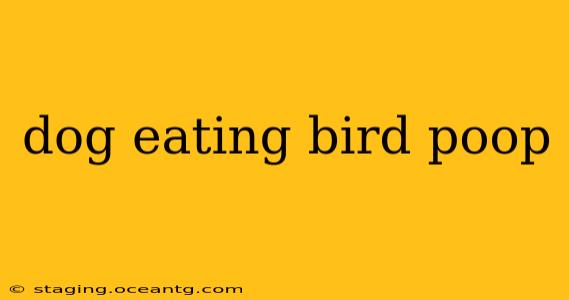Dogs, bless their curious hearts, sometimes engage in behaviors that leave their owners scratching their heads. One such puzzling behavior is coprophagia – the eating of feces, including bird droppings. While it might seem disgusting to us, understanding why dogs eat bird poop can help us address this potentially harmful habit.
Why Do Dogs Eat Bird Poop?
There are several reasons why a dog might be tempted to consume bird droppings. It's rarely a sign of a serious underlying medical condition, but it warrants attention nonetheless. Let's explore some of the key factors:
1. Nutritional Deficiency:
A dog might eat bird poop if their diet is lacking in essential nutrients. While bird droppings aren't a nutritional powerhouse, they can contain trace amounts of vitamins and minerals that a dog's body might be craving. This is particularly true if the dog is on a poor-quality diet or isn't receiving sufficient nutrition.
2. Taste and Smell:
Believe it or not, bird droppings can sometimes have a palatable taste or smell to a dog. The composition of the droppings depends on the bird's diet, and certain seeds or fruits in their diet can make the droppings more appealing to a dog's sense of smell. This is especially true for omnivorous birds.
3. Behavioral Issues:
Sometimes, coprophagia is a learned behavior, stemming from a lack of supervision or even positive reinforcement (if the dog receives attention after the act). Stress, anxiety, or boredom can also contribute to dogs seeking out unusual things to eat.
4. Pancreatitis:
While less common, pancreatitis (inflammation of the pancreas) can lead to dogs exhibiting unusual eating habits, including coprophagia. This is because the pancreas plays a crucial role in digestion, and its dysfunction can lead to digestive issues and altered appetite.
5. Parasites:
In rare instances, parasites can influence a dog's behavior, leading them to consume unusual items. While unlikely to be the sole cause of bird poop consumption, it's important to rule out parasites as a contributing factor.
Is Eating Bird Poop Harmful to Dogs?
The harm posed by consuming bird poop varies depending on several factors. Bird droppings can contain parasites (like Toxoplasma gondii, which can cause toxoplasmosis), bacteria, and other pathogens that can cause illness in dogs. The risk is higher with droppings from birds that carry diseases.
How to Stop Your Dog from Eating Bird Poop
Addressing this behavior requires a multi-pronged approach:
1. Veterinary Check-up:
A vet visit is crucial to rule out any underlying medical conditions, like pancreatitis or parasitic infestations. This ensures you're addressing the root cause rather than simply treating the symptom.
2. Dietary Changes:
Ensure your dog is on a balanced, high-quality diet that meets their nutritional needs. A complete and balanced commercial dog food will typically provide all the essential nutrients.
3. Environmental Management:
Prevent access to bird droppings by keeping your yard clean and regularly removing droppings. Supervision is crucial, especially in areas where birds frequently perch.
4. Training and Positive Reinforcement:
Teach your dog a strong "leave it" command. Reward them when they ignore bird droppings or other unwanted items. Never punish your dog for this behavior, as it can worsen anxiety and make the problem worse.
5. Addressing Underlying Issues:
If behavioral issues like stress or anxiety are suspected, consult a certified professional dog trainer or veterinary behaviorist to address the underlying cause.
What if My Dog Already Ate Bird Poop?
Monitor your dog closely for any signs of illness, such as vomiting, diarrhea, lethargy, or loss of appetite. If you notice any of these symptoms, contact your veterinarian immediately.
By understanding the reasons behind this unusual behavior and implementing the right strategies, you can help your dog avoid the potential risks associated with consuming bird droppings and ensure their health and well-being. Remember, prevention and veterinary guidance are key.
